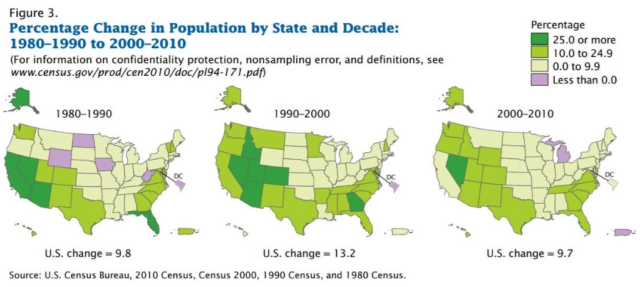The U.S. Constitution Article I, section 2, clause 3 provides that the federal government shall conduct a census every 10 years to count every person regardless of citizenship status living in America.
 The census is, therefore, a total population count. The next decennial census is set for 2020.
The census is, therefore, a total population count. The next decennial census is set for 2020.
What is the purpose of counting every person regardless of citizenship status in the decennial census?
It is simple: The founders of our great nation long ago decided that representational districts should be drawn on the basis of total population. Alexander Hamilton stated that 鈥渆very individual of the community at large has an equal right to the protection of government.鈥�
Drawing representational districts on the basis of total population does not mean that noncitizens get to vote in federal elections or obtain any other political rights.
Counting a noncitizen in a census will not take away or reduce a citizen鈥檚 rights. This just means that our representational districts accurately reflect who lives in the United States.
Why Is The Census Important?
The census is vitally important for many reasons. The data generated from the decennial census serves as the foundation for how many representatives Hawaii has in Congress (currently two), how many Electoral College votes Hawaii has (currently four), and what proportion of $600 billion to $900 billion in federal funds Hawaii receives to support our schools, roads, bridges, hospitals, and more.
Additionally, the census data will help state and local officials, community leaders, and nonprofit organizations identify current and future needs for the communities they serve. The census data will operate to guide private sector investment decisions on job creation, new facilities development, and marketing location.
What鈥檚 The Problem Then?
Unfortunately, it is not that easy to count every person regardless of citizenship status living in Hawaii for the 2020 census.
Asian Americans, Native Hawaiians and Pacific Islanders, people with limited English proficiency, people with low incomes, and young children, which comprise a significant portion of Hawaii鈥檚 populace, are some of the groups that are the most undercounted in the census.

Based on the 2010 census estimates, approximately 33% of Hawaii’s current population lives in . This puts Hawaii鈥檚 AANHPI, low-income, and disadvantaged communities at a severe risk of being undercounted.
Failure to be counted means being denied a full voice in the policy decision-making and federal funding allocation processes related to vital programs, such as the Supplemental Nutrition Assistance Program, Medicaid, emergency funding, etc.
Efforts To Weaponize The Census
Adding to Hawaii鈥檚 inherent census count difficulties is now the completely unnecessary citizenship question, which may be included on the 2020 census.
The Trump administration announced in March 2018 a decision to add a U.S. citizenship question 鈥� 鈥� to the 2020 census. This is despite the U.S. Constitution explicitly requiring the census to count every person regardless of citizenship status. The last time a citizenship question was on a census survey sent to 100% of households was in 1950.
A citizenship question on the census is not needed, because citizenship data is being collected through the American Community Survey and other surveys.
Further, when the U.S. Census Bureau was , the government admitted that “any effort to ascertain citizenship [on the census] will inevitably jeopardize the overall accuracy of the population count,鈥� which argument the bureau has consistently espoused over the years.
More importantly, the bureau鈥檚 found that asking questions about citizenship caused unprecedented concerns among immigrants and those who lived with immigrants, given these hyper-politicized times.
Thus, it is not surprising legal challenges were brought against the Trump administration鈥檚 decision to include a citizenship question on the 2020 census. On April 23 the U.S. Supreme Court as to whether it is legal to include a citizenship question on the 2020 census, and a decision is expected soon.
Approximately one month after the April 23 U.S. Supreme Court oral arguments, revealed that deceased Republican redistricting guru Thomas Hofeller played a major role in the Trump administration鈥檚 request to add the citizenship question to the 2020 census. Hofeller鈥檚 study showed that the question and the use of citizenship data in redistricting would politically benefit 鈥淩epublicans and non-Hispanic whites鈥� and鈥€渨ould clearly be a disadvantage to the Democrats.鈥�
A Potential Force For Good
The 2020 census could be a force for immense good, strengthening our democracy to ensure every individual equal protection under the government as envisioned by our founders.
We cannot let it be used as a weapon to harm Hawaii鈥檚 most vulnerable. Our families, neighbors, and friends must complete the April 2020 Decennial Census so that we are all fully counted!
Common Cause Hawaii stands ready to support the 2020 Hawaii complete count.
 GET IN-DEPTH
REPORTING ON HAWAII鈥橲 BIGGEST ISSUES
GET IN-DEPTH
REPORTING ON HAWAII鈥橲 BIGGEST ISSUES
Community Voices aims to encourage broad discussion on many topics of community interest. It鈥檚 kind of a cross between Letters to the Editor and op-eds. This is your space to talk about important issues or interesting people who are making a difference in our world. Column lengths should be no more than 800 words and we need a current photo of the author and a bio. We welcome video commentary and other multimedia formats. Send to news@civilbeat.org.聽The opinions and information expressed in Community Voices are solely those of the authors and not Civil Beat.
We need your help.
Unfortunately, being named a聽finalist for a聽Pulitzer prize聽doesn’t make us immune to financial pressures. The fact is,聽our revenue hasn鈥檛 kept pace with our need to grow,听.
Civil Beat is a nonprofit, reader-supported newsroom based in 贬补飞补颈驶颈. We鈥檙e looking to build a more resilient, diverse and deeply impactful media landscape, and聽we hope you鈥檒l help by .

